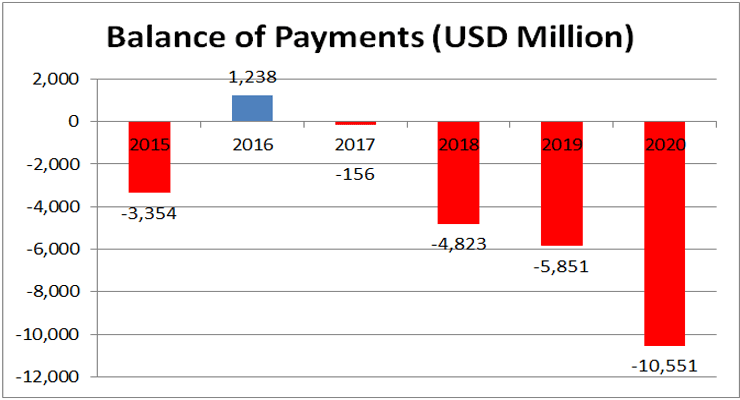Balance of Payments deficit
up 80 percent at $10.6 billion
Central Bank net foreign assets drop by by $14.3 billion
| Share |
|

|
|

|
|
|
|
The deficit in the Balance of Payments (BoP) widened 80 percent to $10.6 billion in 2020 compared with the previous year.

Source: Central Bank
The deficit was reflected by depletion in the Net Foreign Assets (NFAs) of the Central Bank (BDL) of $14.3 billion which could not be offset by a $3.7 billion increase in the NFAs of banks and financial institutions. The NFAs of BDL consist of the difference between its assets and liabilities that are denominated in foreign currencies. Its 2020 NFAs include the net flow of the internationally traded Eurobonds of the Lebanese government that were acquired by BDL during the same year only. The NFAs of banks and financial institutions are also made up of the difference between their assets and liabilities that are in foreign currencies. The decline in their foreign currency liabilities in December 2020 is largely attributed to a decrease in non-resident financial sector liabilities by $568 million that were partly offset by an increase in non-resident customer deposits by $237 million, according to a research paper by Blominvest. As for the foreign currency assets of banks and financial institutions, claims on non-resident customers fell by $74 million in December while claims on non-resident financial sector increased by $111 million. The non-resident securities portfolio grew by $4.5 million and other foreign assets by $517.3 million.
The large BoP deficit was mainly driven by a sharp decline in inflows that outpaced the narrowing in the trade deficit, said Marwan Barakat, Head of Research at Bank Audi. “While it is true that imports plunged by almost half last year leading to savings in the trade deficit, the fall in inflows was more significant within the context of the uncertain environment in the country,” he said.
The cumulated BoP deficit over the ten-year period 2011-2020 totaled $29.6 billion. The previous decade 2001-2010, prior the Syrian war, had recorded a surplus of $24.2 billion.
According to Barakat, the government should target BoP equilibrium in the medium term by enhancing confidence in order to attract inflows, and by incentivizing exports and restricting imports which deplete the financial system’s NFAs.
Blominvest said in its research paper that unlocking foreign aid, restructuring the public debt, and cutting spending including the loss-making electricity sector, will contribute to easing the BoP deficit considerably.
Date Posted: Mar 03, 2021
| Share |
|

|
|

|
|
|
|